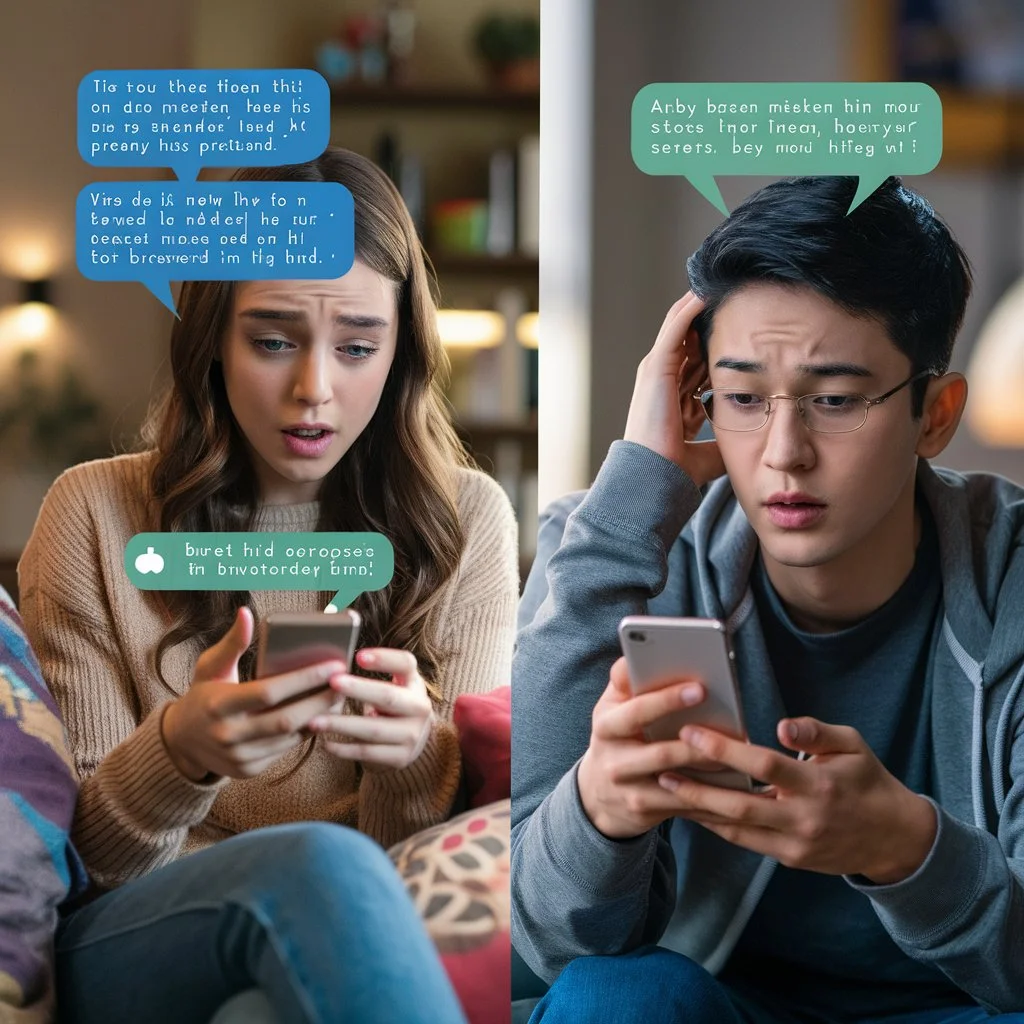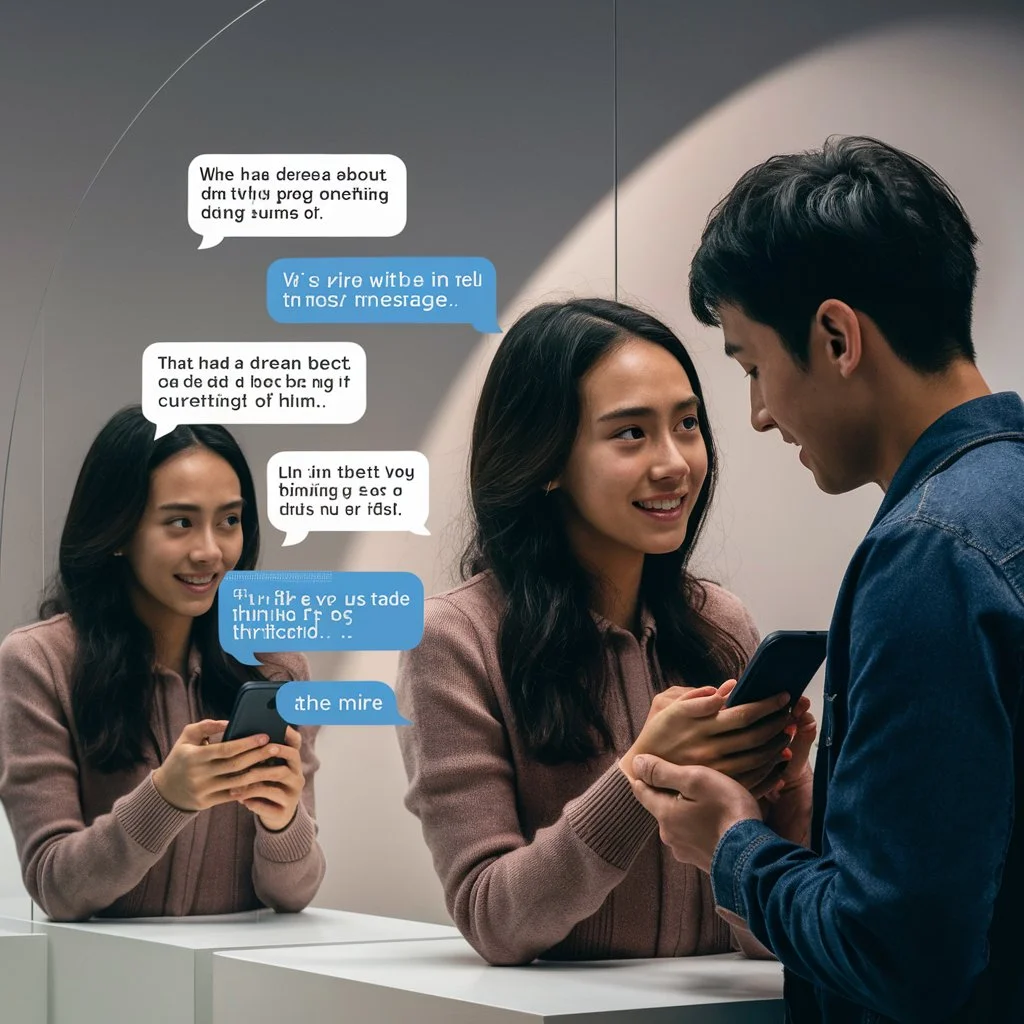Last updated on October 9th, 2024 at 07:23 am
Dreams often hold a mysterious allure, weaving together our subconscious thoughts and emotions. When someone asks, “Did you dream about me?” it’s a moment that invites intimacy and curiosity.
Your response can range from playful to sincere, reflecting your relationship with the person and your own imagination. Here are 30 creative replies to keep the conversation engaging:
Yes, you were in my dream last night!

Acknowledging their presence in your dream right away shows that they were on your mind during your subconscious adventures. This response is straightforward and affirming, leaving room for them to inquire further about the dream.
Example:
Friend:
“Did you dream about me?”
You:
“Yes, you were in my dream last night!”
This response sets a positive tone and invites them to share their thoughts or feelings about being in your dream.
No, sorry, I didn’t dream about you last night.
Honesty is essential in any relationship, even when it comes to dreams. If they weren’t in your dream, a straightforward answer like this helps manage expectations and avoids misunderstandings. It shows that while they may not have been in your dream, you still value their inquiry.
Example:
Friend:
“Did I appear in your dreams?”
You:
“No, sorry, I didn’t dream about you last night.”
This response maintains clarity and opens the door for other topics of conversation without making them feel left out.
I think so, but I can’t quite remember the details.

Suggesting that they might have appeared in your dream, albeit vaguely, adds an air of mystery and intrigue. It shows that they occupy a space in your thoughts, even in your subconscious.
Example:
Friend:
“Did you dream about me?”
You:
“I think so, but I can’t quite remember the details.”
This response encourages them to share their thoughts or feelings about being in your dream, fostering a deeper conversation about dreams and memories.
I dreamt of a lot of things, but I can’t recall if you were in any of them.
Admitting that you had numerous dreams and aren’t sure if they featured in any of them keeps the conversation light and open. It shows that while your dreams are vivid, sometimes the details can be elusive.
Example:
Friend:
“Did I cross your mind while you were asleep?”
You:
“I dreamt of a lot of things, but I can’t recall if you were in any of them.”
This response invites them to share their own dreams or thoughts about dreaming, creating a space for mutual sharing and understanding.
Yes, and it was quite interesting!
Indicating that they were in your dream and it was noteworthy suggests that their presence had an impact on your subconscious experience. This response can lead to further exploration of the dream’s details and meanings.
Example:
Friend:
“Did you dream about me last night?”
You:
“Yes, and it was quite interesting!”
This response invites them to ask more about the dream, encouraging a deeper conversation about dreams and interpretations.
Nope, not this time. Maybe next time!
Playfully suggesting that they weren’t in your dream this time leaves room for future dreams and possibilities. It shows optimism and a sense of humor, keeping the conversation light-hearted.
Example:
Friend:
“Was I in your dream?”
You:
“Nope, not this time. Maybe next time!”
This response can lead to playful banter about dreams and hopes for future dream encounters, enhancing the connection between you both.
You were the star of my dream!

Elevating their role in your dream to that of a star adds humor and charm to your response. It suggests that they hold a special place in your subconscious adventures.
Example:
Friend:
“Did I appear in your dreams?”
You:
“You were the star of my dream!”
This response can lead to a flattering and enjoyable conversation about dreams and their significance in your thoughts.
I had a dream, but you weren’t in it this time.

Politely clarifying that they weren’t part of your recent dream while leaving the door open for future dreams shows respect and honesty. It assures them that while they weren’t in your dream this time, they’re still important to you.
Example:
Friend:
“Did I pop up in your dreams last night?”
You:
“I had a dream, but you weren’t in it this time.”
This response maintains transparency and encourages them to share their thoughts or feelings about dreaming together in the future.
I did dream about you! What do you think it means?
- Engaging them in a discussion about dream interpretation shows interest in their thoughts and feelings. It turns the conversation into a collaborative exploration of dreams and their possible meanings.
Example:
Friend:
“Did you dream about me?”
You:
“I did dream about you! What do you think it means?”
This response invites them to share their insights or interpretations, creating a meaningful dialogue about dreams and their significance.
I think you made a cameo appearance in my dream last night.
Describing their role as a cameo adds a touch of whimsy and suggests they were briefly in your dream. It shows that their presence left an impression on your subconscious experience.
Example:
Friend:
“Was I in your dream?”
You:
“I think you made a cameo appearance in my dream last night.”
This response can lead to a playful conversation about dreams and the unexpected ways people appear in them.
Yes, and it was such a pleasant surprise!
Expressing delight in seeing them in your dream communicates positive feelings towards them. It shows that their presence brought happiness and warmth to your subconscious thoughts.
Example:
Friend:
“Did I appear in your dreams?”
You:
“Yes, and it was such a pleasant surprise!”
This response invites them to share their thoughts or feelings about being in your dream, fostering a deeper connection through shared experiences.
No, but I woke up thinking of you.
Sharing that they were on your mind when you woke up acknowledges their presence in your waking thoughts. It shows that even if they weren’t in your dream, they still hold a significant place in your thoughts and feelings.
Example:
Friend:
“Did you dream about me last night?”
You:
“No, but I woke up thinking of you.”
This response can lead to a heartfelt conversation about the impact they have on your thoughts and emotions.
I dreamt about a lot of things, but your face didn’t make an appearance this time.
Indicating they weren’t in your dream while adding humor keeps the response light-hearted. It shows that while your dreams are vivid and varied, they can sometimes be unpredictable.
Example:
Friend:
“Did I cross your mind while you were asleep?”
You:
“I dreamt about a lot of things, but your face didn’t make an appearance this time.”
This response invites them to share their thoughts or feelings about dreaming together in the future, creating a space for mutual understanding and connection.
Certainly! Here are more creative replies for when someone asks, “Did you dream about me?”
You weren’t in my dream, but let’s create some dreams together today!
Turning the conversation towards making plans together in the present adds a forward-looking and positive twist. It suggests that while they weren’t in your dream, you’re excited about future experiences with them.
Example:
Friend:
“Did you dream about me?”
You:
“You weren’t in my dream, but let’s create some dreams together today!”
This response invites them to join you in planning activities or adventures, fostering excitement and anticipation for shared experiences.
I don’t think so, but now I’m curious about yours!

Expressing curiosity about their dreams shifts the focus of the conversation to them, showing genuine interest in their thoughts and experiences. It encourages them to share their own dreams and feelings.
Example:
Friend:
“Did you dream about me last night?”
You:
“I don’t think so, but now I’m curious about yours!”
This response opens the door for them to share their dreams and interpretations, creating a space for mutual sharing and understanding.
You weren’t in my dream, but you’re on my mind now!
Connecting their inquiry about your dreams to your current thoughts of them shows they’re important to you. It acknowledges their presence in your thoughts and emotions, even outside of dreaming.
Example:
Friend:
“Was I in your dream?”
You:
“You weren’t in my dream, but you’re on my mind now!”
This response can lead to a heartfelt conversation about the impact they have on your daily life and emotions.
I dreamt of something that felt like a movie plot, but no, you weren’t in it.
Describing your dream as cinematic adds a visual element to your response while clarifying their absence. It suggests that your dream was elaborate and vivid, even though they weren’t a part of it.
Example:
Friend:
“Did you dream about me?”
You:
“I dreamt of something that felt like a movie plot, but no, you weren’t in it.”
This response can lead to a playful discussion about the surreal nature of dreams and the stories they create.
You weren’t in my dream, but maybe that means we need to catch up soon!
Suggesting a catch-up based on their absence in your dream shows a desire to connect in waking life. It turns the conversation towards making plans to spend time together, reinforcing your bond outside of dreams.
Example:
Friend:
“Did I appear in your dreams?”
You:
“You weren’t in my dream, but maybe that means we need to catch up soon!”
This response encourages them to join you in planning a meet-up or conversation, enhancing your relationship beyond dream scenarios.
I had a dream, but it was so bizarre, I can’t quite remember who was in it.
Describing your dream as bizarre adds humor and intrigue while acknowledging the difficulty in recalling specific details. It shows that while your dreams are vivid, they can also be unpredictable and unusual.
Example:
Friend:
“Did you dream about me last night?”
You:
“I had a dream, but it was so bizarre, I can’t quite remember who was in it.”
This response can lead to a humorous conversation about the strange and fascinating aspects of dreams.
No, but just me and a flying elephant last night!
Using humor and whimsy to describe your dream shifts the focus away from them in a playful manner. It adds a touch of creativity and imagination to your response, making it memorable and enjoyable.
Example:
Friend:
“Was I in your dream?”
You:
“No, but just me and a flying elephant last night!”
This response can lead to laughter and playful banter about the weird and wonderful world of dreams.
You weren’t in my dream, but you’re always in my thoughts.
Expressing that they are always on your mind shows deep affection and care. It reassures them of their significance in your life, whether or not they appeared in your dreams.
Example:
Friend:
“Did I appear in your dreams?”
You:
“You weren’t in my dream, but you’re always in my thoughts.”
This response can lead to a heartfelt conversation about the strength of your bond and the ways you cherish each other.
I dreamt about something unrelated, but thinking of you now!

Acknowledging their inquiry about your dreams while sharing your current thoughts of them shows consideration and warmth. It shifts the conversation towards your present connection and feelings.
Example:
Friend:
“Did you dream about me?”
You:
“I dreamt about something unrelated, but thinking of you now!”
This response invites them to share their thoughts and feelings, fostering a meaningful exchange about your relationship.
I had a dream, but it was too strange to make sense of who was in it.
Describing your dream as strange adds intrigue and humor while admitting the challenge of understanding its content. It shows that dreams can be unpredictable and fascinating, even if they don’t include specific individuals.
Example:
Friend:
“Did you dream about me last night?”
You:
“I had a dream, but it was too strange to make sense of who was in it.”
This response can lead to a fun conversation about the bizarre and mysterious nature of dreams.
Certainly! Here are more creative replies for when someone asks, “Did you dream about me?”
You weren’t in my dream, but let’s make it happen tonight!
Turning the conversation towards creating future dreams together adds a playful and anticipatory tone. It suggests excitement about the possibility of dreaming together and reinforces the bond between you.
Example:
Friend:
“Did you dream about me?”
You:
“You weren’t in my dream, but let’s make it happen tonight!”
This response invites them to join you in imagining what future dreams might hold, sparking creativity and shared anticipation.
No dreams of you last night, but I’m wide awake thinking of you now!
Playfully indicating their absence in your dreams while emphasizing their presence in your thoughts adds a touch of humor and affection. It shows that they occupy your mind even when you’re awake.
Example:
Friend:
“Was I in your dreams?”
You:
“No dreams of you last night, but I’m wide awake thinking of you now!”
This response can lead to a sweet and light-hearted conversation about the impact they have on your daily life.
My dreams were all over the place, but your smile might have sneaked in!
Suggesting that their smile made an appearance in your dream adds a flirty and complimentary twist. It acknowledges their positive influence on your subconscious thoughts.
Example:
Friend:
“Did I appear in your dreams?”
You:
“My dreams were all over the place, but your smile might have sneaked in!”
This response invites them to share their thoughts or feelings about their role in your dream, fostering a playful exchange.
No dreams of you last night, but you’re definitely my favorite thought today!
Expressing that they are your favorite thought of the day shows genuine affection and admiration. It reassures them of their importance in your life, whether or not they appeared in your dreams.
Example:
Friend:
“Did you dream about me?”
You:
“No dreams of you last night, but you’re definitely my favorite thought today!”
This response can lead to a heartwarming conversation about the ways they brighten your day.
I had a dream, but it was a solo adventure this time!
Indicating that your dream was a solo adventure while leaving room for shared dreams in the future maintains honesty and openness. It shows that while your dreams can be solitary, you’re open to including them in future dream scenarios.
Example:
Friend:
“Did you dream about me?”
You:
“I had a dream, but it was a solo adventure this time!”
This response invites them to join you in imagining future dreams together, fostering anticipation and connection.
No dreams of you last night, but who knows what tonight might bring!

Suggesting that tonight’s dreams might include them adds an element of mystery and excitement. It shows optimism and curiosity about what the future holds in your subconscious adventures.
Example:
Friend:
“Was I in your dreams?”
You:
“No dreams of you last night, but who knows what tonight might bring!”
This response can lead to a playful discussion about the unpredictability of dreams and the possibilities they hold.
I dreamt of a tropical beach, but you weren’t there this time!
Describing your dream setting adds a visual element while clarifying their absence. It shows that your dreams can transport you to different places and experiences, even without specific individuals.
Example:
Friend:
“Did you dream about me?”
You:
“I dreamt of a tropical beach, but you weren’t there this time!”
This response can lead to a conversation about dream settings and the imagery that appears in our subconscious.
No dreams of you last night, but you’re always in my heart!
Expressing that they are always in your heart shows deep affection and care. It reassures them of their significance in your life, whether or not they appeared in your dreams.
Example:
Friend:
“Did I appear in your dreams?”
You:
“No dreams of you last night, but you’re always in my heart!”
This response can lead to a heartfelt conversation about the strength of your bond and the ways you cherish each other.
My dreams were a wild ride, but your laughter might have echoed through!
Suggesting that their laughter echoed through your dream adds a whimsical and joyful touch. It shows that their presence brings happiness and lightness to your subconscious experiences.
Example:
Friend:
“Did you dream about me?”
You:
My dreams were a wild ride, but your laughter might have echoed through!”
This response can lead to a playful discussion about the sounds and sensations that appear in our dreams.
No dreams of you last night, but now I’m wondering what you were up to in yours!
Expressing curiosity about their dreams shifts the focus of the conversation to them, showing genuine interest in their thoughts and experiences. It encourages them to share their own dreams and interpretations.
Example:
Friend:
“Did you dream about me last night?”
You:
“No dreams of you last night, but now I’m wondering what you were up to in yours!”
This response opens the door for them to share their dreams and feelings, fostering a meaningful exchange about their subconscious adventures.
No dreams of you last night, but I woke up smiling!
Indicating that you woke up with a smile suggests that thoughts of them bring happiness and positivity into your day, even if they weren’t in your dreams.
Example:
Friend:
“Did you dream about me?”
You:
“No dreams of you last night, but I woke up smiling!”
This response can lead to a cheerful conversation about the impact they have on your mood and emotions.
I had a dream, but it was a mysterious plot with no familiar faces!
Describing your dream as mysterious adds intrigue while clarifying their absence. It shows that your dreams can unfold like stories with unpredictable twists and turns.
Example:
Friend:
“Did you dream about me?”
You:
“I had a dream, but it was a mysterious plot with no familiar faces!”
This response can lead to a conversation about the themes and narratives that appear in our dreams.
No dreams of you last night, but I did think of you before falling asleep!

Connecting their inquiry about your dreams to your pre-sleep thoughts of them shows consideration and warmth. It shifts the conversation towards your intentions and emotions before bedtime.
Example:
Friend:
“Did you dream about me?”
You:
“No dreams of you last night, but I did think of you before falling asleep!”
This response can lead to a discussion about bedtime routines and the thoughts that occupy our minds before sleep.
My dreams were a whirlwind, but your name might have slipped in!
Suggesting that their name appeared in your dream adds a personal touch while leaving room for interpretation. It shows that they occupy a special place in your thoughts and memories.
Example:
Friend:
“Did you dream about me?”
You:
“My dreams were a whirlwind, but your name might have slipped in!”
This response can lead to a playful conversation about the ways our minds process and recall information during sleep.
No dreams of you last night, but I’m open to a dream date tonight!
Playfully suggesting a dream date together adds a flirty and imaginative twist. It invites them to join you in envisioning a romantic or adventurous scenario in your dreams.
Example:
Friend:
“Did you dream about me?”
You:
“No dreams of you last night, but I’m open to a dream date tonight!”
This response can lead to a fun and creative discussion about the possibilities of shared dreams and fantasies.
I dreamt of flying unicorns, but you weren’t riding one this time!
Describing your dream imagery adds a whimsical and fantastical element while clarifying their absence. It shows that your dreams can include magical and imaginative elements, even without specific individuals.
Example:
Friend:
“Did you dream about me?”
You:
“I dreamt of flying unicorns, but you weren’t riding one this time!”
This response can lead to a lighthearted conversation about the surreal and imaginative aspects of dreams.
No dreams of you last night, but you’re my first thought this morning!
Expressing that they are your first thought in the morning shows genuine affection and admiration. It reassures them of their importance in your life, whether or not they appeared in your dreams.
Example:
Friend:
“Did I appear in your dreams?”
You:
“No dreams of you last night, but you’re my first thought this morning!”
This response can lead to a heartfelt conversation about the ways they brighten your day and occupy your thoughts.
My dreams were like a movie marathon, but your cameo was missing!
Describing their role as a cameo adds a touch of whimsy and suggests they were briefly in your dream. It shows that they make occasional appearances in your subconscious thoughts.
Example:
Friend:
“Did you dream about me?”
You:
“My dreams were like a movie marathon, but your cameo was missing!”
This response can lead to a playful discussion about the roles and characters that appear in our dreams.
No dreams of you last night, but you’re always a dream in my waking thoughts!
Expressing that they are a dream in your waking thoughts shows deep affection and care. It reassures them of their significance in your life, whether or not they appeared in your dreams.
Example:
Friend:
“Did I appear in your dreams?”
You:
“No dreams of you last night, but you’re always a dream in my waking thoughts!”
This response can lead to a heartfelt conversation about the strength of your bond and the ways you cherish each other.
I dreamt of a cozy cabin, but you weren’t there to share it with me!
Describing your dream setting adds a visual element while clarifying their absence. It shows that your dreams can transport you to different places and experiences, even without specific individuals.
Example:
Friend:
“Did you dream about me?”
You:
“I dreamt of a cozy cabin, but you weren’t there to share it with me!”
This response can lead to a conversation about dream settings and the imagery that appears in our subconscious.
Conclusion
These responses aim to keep the conversation playful, affectionate, and imaginative when responding to whether or not they were in your dreams. Each reply offers a unique perspective on dreams and relationships, fostering connection and understanding between you and the person asking. Whether your dreams include them or not, these responses invite further exploration and conversation, making the topic of dreams a fun and enjoyable exchange.

Nicholas Clark is the visionary behind ReplySwift.com. With a talent for crafting concise and impactful responses, Nicholas helps others communicate with clarity and confidence. On ReplySwift.com, he provides expert advice, practical templates, and valuable insights to enhance every reply.












